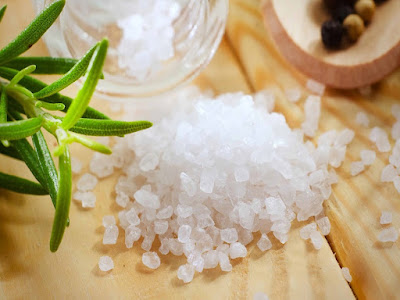The results of a recent study indicate that reducing salt intake can be as harmful as increasing it, even for those who suffer from high blood pressure.. Is there a certain amount that we have to adhere to in our daily salt consumption?
It is common knowledge among people and many researchers, that reducing salt intake is good for health, and that the less salt a person eats, the better for his health.
But this is not entirely true, according to a new study stating that it can harm health. Even those who suffer from high blood pressure can reflect negatively when reducing salt intake.
A team of international researchers, including biostatistician and epidemiologist Andrew Mint from McMaster University in Canada, conducted a study that included analysis and evaluation of information related to 133,118 people from 49 countries, during which it was found that those who eat less than 7.5 grams of salt per day are more likely to have a stroke. Stroke and heart attack, and the death rate among them is higher compared to those who eat moderate amounts of salt, according to the German newspaper "Süddeutsche Zeitung".
In the same context, in alerting to the dangers of excessive salt intake, the result of a study conducted by the University of Glasgow indicates that patients with high blood pressure, in which the amount of chloride, which is the second element in the composition of table salt, in their body was few, had a higher death rate compared to other high blood pressure patients, according to what was published on the website of the German Focus magazine.
The site indicates that a large study that lasted 13 years, including 13,000 people, concluded that the researchers concluded that the risk was very great for the lives of people with circulatory diseases and blood pressure, who had little chloride in their blood, compared to other patients.
Hence, researchers advise moderation in salt intake, as excessive reduction of it, as well as excessive consumption of it, reflect negatively and pose a threat to health, whether one suffers from high blood pressure or not.
So what is the appropriate amount of salt that the human body needs daily?
Canadian researcher Andrew Mint answers that the human body needs between 7.5 and 15 grams of salt per day.
Aside from the dispute about table salt and the quantities to be eaten, the fluid balance in the human body and food absorption depend on salt, which maintains pressure in the lining of blood vessels.
This is explained by Stefan Bischof, Professor of Nutritional Medicine at Guggenheim University in Germany, saying that salt helps in the process of passing nutrients into cells and excreting waste products from them, and is also important in, among other things, the transmission of nerve impulses, muscle movements and bone density. "Salt also helps the body retain water," he adds, noting that a lack of salt may lead to dehydration.
It is common knowledge among people and many researchers, that reducing salt intake is good for health, and that the less salt a person eats, the better for his health.
But this is not entirely true, according to a new study stating that it can harm health. Even those who suffer from high blood pressure can reflect negatively when reducing salt intake.
A team of international researchers, including biostatistician and epidemiologist Andrew Mint from McMaster University in Canada, conducted a study that included analysis and evaluation of information related to 133,118 people from 49 countries, during which it was found that those who eat less than 7.5 grams of salt per day are more likely to have a stroke. Stroke and heart attack, and the death rate among them is higher compared to those who eat moderate amounts of salt, according to the German newspaper "Süddeutsche Zeitung".
In the same context, in alerting to the dangers of excessive salt intake, the result of a study conducted by the University of Glasgow indicates that patients with high blood pressure, in which the amount of chloride, which is the second element in the composition of table salt, in their body was few, had a higher death rate compared to other high blood pressure patients, according to what was published on the website of the German Focus magazine.
The site indicates that a large study that lasted 13 years, including 13,000 people, concluded that the researchers concluded that the risk was very great for the lives of people with circulatory diseases and blood pressure, who had little chloride in their blood, compared to other patients.
Hence, researchers advise moderation in salt intake, as excessive reduction of it, as well as excessive consumption of it, reflect negatively and pose a threat to health, whether one suffers from high blood pressure or not.
So what is the appropriate amount of salt that the human body needs daily?
Canadian researcher Andrew Mint answers that the human body needs between 7.5 and 15 grams of salt per day.
Aside from the dispute about table salt and the quantities to be eaten, the fluid balance in the human body and food absorption depend on salt, which maintains pressure in the lining of blood vessels.
This is explained by Stefan Bischof, Professor of Nutritional Medicine at Guggenheim University in Germany, saying that salt helps in the process of passing nutrients into cells and excreting waste products from them, and is also important in, among other things, the transmission of nerve impulses, muscle movements and bone density. "Salt also helps the body retain water," he adds, noting that a lack of salt may lead to dehydration.
